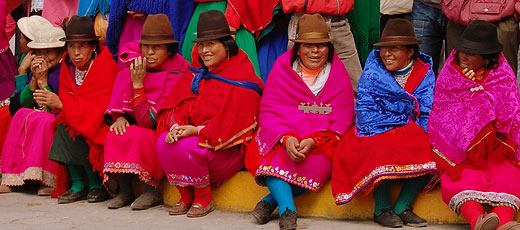10 Spanish Slang Words to Know Before Traveling to Ecuador.
From a spanishdict Blog

Like any country, Ecuador has it’s fair share of slang words that the locals use to talk about anything from fruits at the store to cold weather. While it’s important to first work on your pronunciation, feel free to incorporate some of these words into your Spanish vocabulary to sound more like a native speaker. Above all, get ready to impress the doña at the local market!
While some of these Spanish slang words are not unique to Ecuador, they may take on a slightly different connotation than you are used to. Don’t worry, we’re here to help. Happy learning!
1. Farrear = To party
Farrear is the Ecuadorian equivalent of the English phrase "to party." It sounds similar to its synonym festejar, which is an easy way to remember this word's meaning.
Example:
Farreamos toda la noche en una chiva para el cumpleaños de mi mejor amiga. (We partied all night in a party bus for my best friend's birthday.)
2. Chuta = Shoot
Pretty much everyone uses this expression. Think of it as the English shoot.Chuta is what your mom says when she forgets her keys or what your uncle shouts at the TV when his team misses a gol
Example:
Chuta! Se me olvidó llevar a mi perrito enfermo al veterinario.
(Shoot! I forgot to bring my sick puppy to the vet.)
3. Ñaño/a = Brother / sister
Ñaño/a is used in Ecuador to talk about your brothers or sisters.
Example:
Friend: Ñaña, pasa tiempo conmigo.
(Sister, spend time with me.)
You: ¡Por supuesto! (Of course!)
4. Ahuevar = To chicken out
Ahuevar means to chicken out. If you're scared or frightened, you would use this term to express that.
Example:
Yo te acompaño cuando hagamos puenting para que no te ahueves al último minuto.
(I'll accompany you when we bridge jump, to make sure you don't chicken out at the last minute.)
5. Achachay = I'm cold / It's cold
Are you cold? Then you should probably use achachay to indicate that it's cold or that you're feeling cold. You can use this when you'd be tempted to say brrr. Additionally, you can use arrarray to indicate that you've burned yourself because something you came in contact with is very hot.
Example:
¡Achachay! Cierra la puerta para que no entre el frío. (Brrr! Close the door so the cold air doesn't come in.)
6. Chuchaqui = I have a hangover / I'm hungover
Did you party too much last night? You can use chuchaqui to indicate your current state after a night out drinking. This is the Ecuadorian slang used to indicate both that you're hungover and that you have a hangover.
Example:
Como un desayuno grandísimo para aliviarme del *chuchaqui.
(I eat a large breakfast to alleviate myself of my hangover.)
7. De ley = Obviously / Of course
De ley is used a ton by Ecuadorians, and it means obviously, or of course.
A Spanish synonym for it would be claro que sí.
Example:
Friend: Kathy, ¿este es el bus que nos lleva al centro histórico?
(Kathy, is this the bus that takes us to the historic center)?
Kathy: De ley, gordo. Sube antes de que se vaya.
(Obviously, dear. Get on it before it leaves.)
8. Gordo/a = Dear
You might be surprised to hear people calling each other gordo, literally fatty. But don't worry, Ecuadorians aren't rude. In Ecuador, calling someone gordo/a is an affectionate term used between friends. Think of it as a term of enDEARment.
Example:
Someone on the street: ¡Oye* gordo!* ¿Qué pasa?
(Hey, friend! What's up?)
Friend: Nada, ¿y tú?
(Nothing, and you?)
9. Estoy chiro/a = I'm broke
If you're getting ready to go out and someone says* estoy chiro*, it means they probably won't be able to join you on a night out. This phrase is used to say that you're broke and don't have any money.
Example:
Friend: No puedo pagar; estoy chiro.
(I can't pay; I'm broke.)
You: Está bien, puedo pagar por ti
.(It's fine, I can pay for you.)
10. ¿Cachas? = Got it?
This term is used very colloquially in Ecuador to inquire if you understand something. Although it's usually used as a question, Ecuadorians also use it to respond to someone to communicate that they understand what is being clarified
Example:
Mom: Mira, hay que girar la llave así para abrir la puerta, ¿cachas?
*(Look, you have to turn the key like this to open the door, understand?)
You: Ah sí, ahora cacho. (Ah, yeah, I get it now.)
The best way to learn is to practice them
so try out a few sentences using them all.
7 Answers
Le pedí a mi ñaño gordo que viniera conmigo en mi moto, pero se ahuevó porque andaba chuchaqui por haber farreado la noche anterior y no pudo. ¿Cachas?
I asked my dear brother to come with me on my motorcycle, but he chickened out because he was hung over due to having partied the night before, and couldn't. Get it?

Down on his luck

He is stony broke .
Hasn't got a quid to bless himself.
Down on his luck.
up the creek without a paddle.
Poor as a church mouse
These all mean the same in Australia ,- He has no money.
Todo esto significa lo mismo en Australia, - Él no tiene dinero.
Así que en Ecuador se puede decir,Estoy chiro
So in Ecuador he can say, I am broke.
I had to delete a post from here today for using ,I should say
inappropriate language, but in reality they were filthy words
There are web sites that we all know we can look at if that
is what we want , but not here on SD please. Also these words
were chosen by SD as typical to México , the idea was to try
to practice and get to know these 10 words rather than add more
Gorda, ¿a qué hora...?
I couldn't think of a sentence
Me encanta la cultura indígena del Ecuador.

![enter image description here][2]
[2]: http://a57.foxnews.com/global.fncstatic.com/static/managed/img/fn-latino/lifestyle/0/0/Ecuador Indigenous.jpg
Vamos a bailar de esta manera ,¿ cachas?
Let's dance this way, get it?
Dos Hermanas / Agenda
Zarzuela, carnaval y flamenco para el fin de semana en Dos Hermanas.
I had a funny experience in this town on my way to visit our "annierats" .

Cuando he mirado a estos bebés en la selva de Borneo
grité ¡"chuta"! , rápida mi cámera.
When I looked at these babies in the jungles of Borneo
I shouted "shoot"! fast my CAMERA.
















